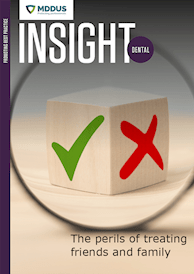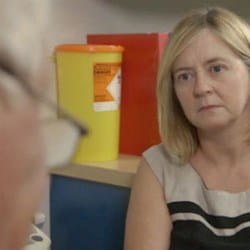These cases are based on actual calls made to MDDUS advisers and are published here to highlight common challenges within dental practice. Details have been changed to maintain confidentiality.
Re-registering a "difficult" patient
Q. We have had a challenging patient at our practice (based in Scotland) for a number of years. He frequently failed to attend appointments, was rude, had unrealistic treatment expectations and often refused to pay. Last month he left a voicemail message saying he had gone to another practice. But yesterday he turned up at reception and asked to be seen, claiming he had only gone elsewhere for private care. Practitioner Services have confirmed there is no active registration for him at our practice. What should we do?
If the patient is no longer registered with your practice then it would be reasonable for you to suggest he return to his registered practice for routine treatment. Should the patient have an urgent problem and ask you to assist him, then there would be a general expectation for you to try to help him in that matter. The patient may ask to re-register with the practice, and you would be obliged to deal with this request in the usual way (bearing in mind that practices should only refuse to register a patient if they have reasonable grounds.) Had the patient still been registered with your practice then, as part of the lifetime registration of NHS dental patients in Scotland, there would have been an obligation upon you to continue to provide treatment for this patient (unless you chose to de-register him). Be sure to comply with General Dental Council guidance on ending the professional relationship with a patient (principle 1.7.8). You may also find it useful to read our advice for dentists on ending the patient relationship.
Pacemaker risks
Q. One of my patients has recently had a pacemaker fitted. He is due to come in for his regular scale and polish, but I’m now concerned as to whether it is still appropriate for me to carry out this treatment in case the electronic devices I use interfere with his pacemaker. What should I do?
While MDDUS is not in a position to provide direct clinical advice, we would advise you to familiarise yourself with the latest guidance on this area. NICE guidance Prescribing in dental practice, has a paragraph on pacemakers which states: “Some ultrasonic scalers, electronic apex locators, electro-analgesic devices, and electrocautery devices interfere with the normal function of pacemakers (including shielded pacemakers) and should not be used.” It advises dentists to consult the manufacturer’s literature where possible. It adds: “If severe bradycardia occurs in a patient fitted with a pacemaker, electrical equipment should be switched off and the patient placed supine with the legs elevated.” You should discuss the matter in detail with the patient before agreeing the next steps. It may be useful to consult his cardiologist or the periodontal department of your local dental hospital.
Retention of study casts
Q. We have a large number of study casts and special trays stored in the practice which are taking up a lot of space. How long are we obliged to keep these?
Study casts form part of the clinical record and as such it is advised that, for adults, you retain them for a period of 11 years since the patient last attended. For children, they should be retained for a period of 11 years (again, from the time the patient last attended), or up to the age of 25, whichever is greater. Remember that study casts must not be disposed of to landfill – special arrangements should be made for them to be confidentially destroyed. Special trays do not form part of the clinical record and would be considered in the same light as working casts. While you are not obliged to retain them, it may be useful to have them for reference in the event of a patient complaint or claim.
This page was correct at the time of publication. Any guidance is intended as general guidance for members only. If you are a member and need specific advice relating to your own circumstances, please contact one of our advisers.
Read more from this issue of Insight Dental

Save this article
Save this article to a list of favourite articles which members can access in their account.
Save to library

